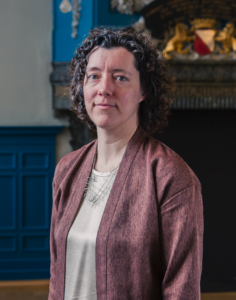march, 2023
Event Details
Motion capture-based renderings of dance performance constitute a complex, but highly interesting cultural phenomenon at a time when motion recognition and haptic technologies increasingly affect society at large. Optical motion
Event Details
Motion capture-based renderings of dance performance constitute a complex, but highly interesting cultural phenomenon at a time when motion recognition and haptic technologies increasingly affect society at large. Optical motion capture technologies have been used to support the analysis and transmission of movement practices. This can be understood as an alternative way to bring such practices into the ‘orbit of writing’ (Rotman 2008). In this lecture, Laura Karreman evaluates implications of contemporary practices of digital dance capture. How is dance conceived of as a type of knowledge that can be transmitted in these practices? How does motion capture invite us to know dance differently? Foregrounding the value of dancers’ embodied experiences, Karreman suggests that the pursuit to render motion data into accessible feedback calls for further investigation of topics that are typically part of the tacit knowledge of the dancer. She proposes the notion of ‘embodied computation’ to describe the role embodied knowledge can play in designing ways to make motion data speak. Furthermore, using a dramaturgical perspective, the lecture argues that motion capture of human movement needs to be understood as a site for performance that uses multiple strategies of staging. It is an invitation to reimagine motion capture as an apparatus of motion creation.
 Laura Karreman is an assistant professor in media and performance studies in the Department of Media and Culture Studies at Utrecht University, the Netherlands. Until the end of March 2023, she works at the Centre for Transformative Media Technologies at Swinburne University as part of an Erasmus+ staff mobility exchange programme. She teaches in the MA program Contemporary Theatre, Dance and Dramaturgy and the Research MA Media, Art and Performance Studies (MAPS). She is also the programme coordinator of the MAPS programme. She researches the role of embodied knowledge in dance transmission practices, the role of digitization in performance archives, and epistemological questions that relate to new notions of dance and performance knowledge. Her PhD dissertation, “The Motion Capture Imaginary: Digital Renderings of Dance Knowledge” (Ghent University, 2017), examines how dancing bodies are reimagined through emerging practices and applications involving motion capture and other digital capturing technologies. Within the research group Transmission in Motion of the Department of Media and Culture Studies (UU), she relates to topics such as dramaturgy, somatechnics and mobilizing the archive In her current research she continues to investigate the rapid growth of motion capture as a tool for movement research and animation in order to critically evaluate the cultural and ethical implications of such practices, which now often remain invisible. Recent publications include the co-edited volume Performance and Posthumanism: Staging Prototypes of Composite Bodies (Palgrave Macmillan 2021), and the book chapters “Breathing Matters: Breath as Dance Knowledge” in Futures of Dance Studies (The University of Wisconsin Press, 2020) and “How does motion capture mediate dance?” in Contemporary Choreography: A critical reader (Routledge, 2017). In 2024, she is the conference director of the 9th International Conference on Movement and Computing (MOCO) at Utrecht University.
Laura Karreman is an assistant professor in media and performance studies in the Department of Media and Culture Studies at Utrecht University, the Netherlands. Until the end of March 2023, she works at the Centre for Transformative Media Technologies at Swinburne University as part of an Erasmus+ staff mobility exchange programme. She teaches in the MA program Contemporary Theatre, Dance and Dramaturgy and the Research MA Media, Art and Performance Studies (MAPS). She is also the programme coordinator of the MAPS programme. She researches the role of embodied knowledge in dance transmission practices, the role of digitization in performance archives, and epistemological questions that relate to new notions of dance and performance knowledge. Her PhD dissertation, “The Motion Capture Imaginary: Digital Renderings of Dance Knowledge” (Ghent University, 2017), examines how dancing bodies are reimagined through emerging practices and applications involving motion capture and other digital capturing technologies. Within the research group Transmission in Motion of the Department of Media and Culture Studies (UU), she relates to topics such as dramaturgy, somatechnics and mobilizing the archive In her current research she continues to investigate the rapid growth of motion capture as a tool for movement research and animation in order to critically evaluate the cultural and ethical implications of such practices, which now often remain invisible. Recent publications include the co-edited volume Performance and Posthumanism: Staging Prototypes of Composite Bodies (Palgrave Macmillan 2021), and the book chapters “Breathing Matters: Breath as Dance Knowledge” in Futures of Dance Studies (The University of Wisconsin Press, 2020) and “How does motion capture mediate dance?” in Contemporary Choreography: A critical reader (Routledge, 2017). In 2024, she is the conference director of the 9th International Conference on Movement and Computing (MOCO) at Utrecht University.
Time
(Thursday) 2:00 pm - 3:00 pm


Comments are closed for this article!